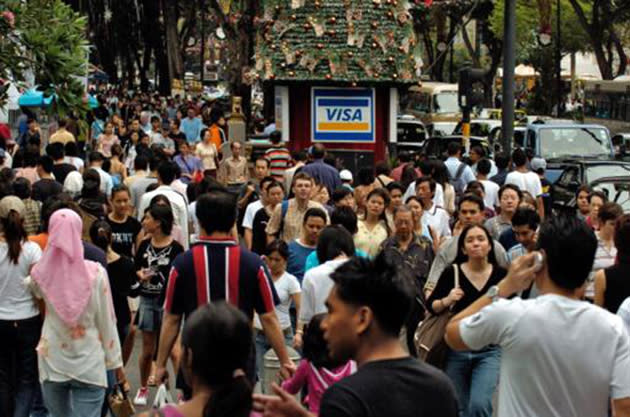COMMENT: Singapore, discrimination and ‘Singaporeans First’

Singapore's online community has been abuzz with talk of foreigners (what else?), employment practices and the concept of "Singaporeans First".
“This position is open to candidates who are not Singaporean Citizens or PR.”
It was this short sentence in an advertisement posted by Randstad that blew up a simple recruitment exercise into a major controversy. To many outraged readers, this sentence indicated that the company was not interested in Singaporean applicants. It was therefore a clear example of how Singaporeans were being unfairly treated and discriminated against by employers.
This played straight into the rhetoric of those insisting on portraying Singaporeans as the pitiable, bullied victims of a deliberate campaign to squeeze them out of their own home (see my previous article). Look at what these employers are doing! They’re employing foreigners and leaving Singaporeans jobless and hungry! Look at these foreigners, taking our jobs and ruining our lives!
However, others soon pointed out that the advertisement had been misinterpreted. In a strongly-worded Facebook note, Vincent Wijeysingha wrote:
“This advert, by Ranstad, should not have been subjected to this kind of treatment. To anyone familiar with job adverts, the phrase ‘open to candidates who are not Singaporean Citizens or PR’ has never been intended to mean only foreigners and PRs. It is a way of indicating that the job is also open to non-Singaporeans. It is a global industry standard.”
It should have been enough to clear the air and show up the whole drama as the storm in a teacup that it was, but once again it led to discussions and arguments over immigration, nationalism and "Singaporeans First".
A Facebook status I posted on my page questioning the "Singaporeans First" rhetoric drew very forceful comments. There were impassioned arguments made for protecting the interests of Singaporeans who were facing hard times in their own home country. There were also angry comments directed at foreigners “who think that they could reserve all the jobs they have for their own kind, own race”. And of course, there were the familiar accusations: I was showing “excessive concern” for foreigners, and choosing to fight their cause over that of Singaporeans.
It highlights a problem that has grown in Singapore over recent years. It’s not just an issue of xenophobia (although that is also a massive problem that people refuse to admit to); Singapore’s problem is that more and more of us appear to have bought into the binary of "Us versus Them". And this drawing up of battle lines is something that cannot be corrected quickly enough.
The use of binaries is common enough in the media. My own research has shown the constant appeal to national identity, and the media’s encouragement of the reader to see things as black or white. It’s an easy technique for writers to use to refute accusations of bias and subjectivity, but such a mindset carried into everyday life in Singapore only serves to obscure the debates we really need to have.
In an environment where people are anxious, angry and afraid for their future, nuance has all but disappeared. As mentioned in my previous article, the "victimised Singaporean" narrative paints one as either a “true blue Singaporean” or a PAP lapdog. The same can be seen in the discussion of the "Singaporean First" rhetoric: question it under threat of being labelled “pro-foreigner” and accused of forsaking your own people. People aren’t encouraged to think through a complex problem and work out its intricacies; they are to accept the rhetoric uncritically or be shouted out the room.
It's unfortunate, because this nuance is especially important when trying to come up with solutions to Singapore's challenges. Answers will not come from seeing foreigners as enemies that need to be dealt with, or Singaporeans as poor sufferers who need to be protected at all costs.
There are many policies in Singapore that need to be tweaked, changed or reversed. Immigration policy could very well be one of them. A liberal immigration policy might not be the best thing for a small country already struggling with limited space and resources. A case could be made for adjusting our immigration quotas to reduce the number of migrants so that we can better focus on taking care of the people who are already here, regardless of their nationality.
But once we've let people in, we cannot punish them for seizing the opportunity to improve their lives in Singapore.
The best response to the Randstad advertisement (and the other case involving Swiss restaurant La Fondue) is not to shout for foreigners to get out of our space, but to demand anti-discriminatory legislation that would make it harder for employers to discriminate against anyone – Singaporeans and foreigners alike.
Many of the struggles faced by Singaporeans are also faced by foreigners. Exploitative employers who can hire and fire as they like and wages that don't match the cost of living affect us all. Rather than turning on one another and drawing lines in the sand, it would be much more useful to advocate for better labour rights and protections, and a minimum wage (dare I say a living wage?) policy that would allow everyone to better support themselves and their families.
The problems we have will not be solved quickly. People are likely to be worried and stressed out for a long time to come. But getting angry and burrowing deeper into a siege mentality won't make change come any sooner.
Kirsten Han is a Singaporean blogger, journalist and filmmaker. She is also involved in the We Believe in Second Chances campaign for the abolishment of the death penalty. A social media junkie, she tweets at @kixes. The views expressed are her own.

